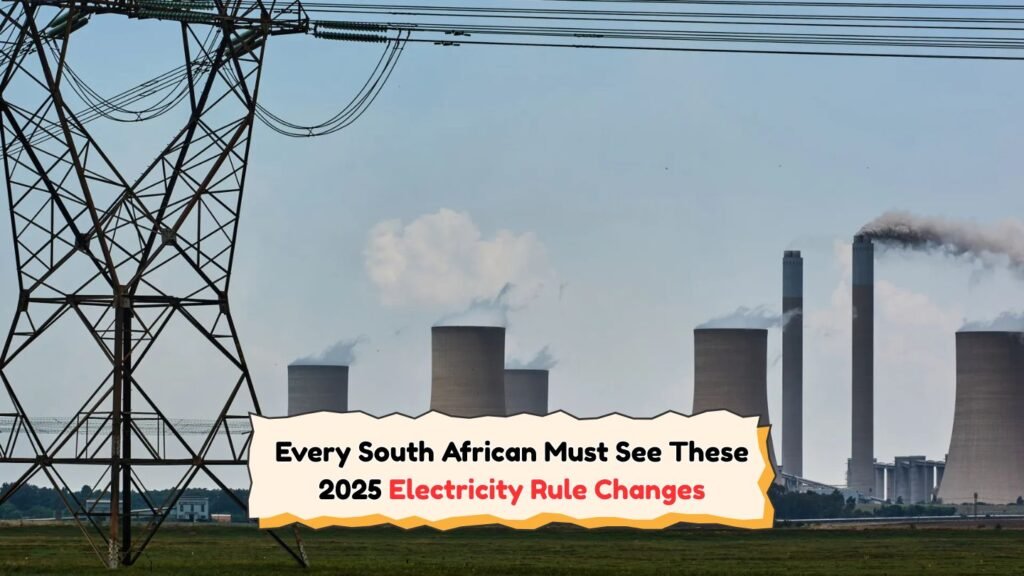South Africans Alert: Major Electricity Cost and Rule Changes Coming in 2025: With the year 2025 on the horizon, South Africans are set to experience significant shifts in electricity costs and regulatory measures. These changes, initiated by the government in response to evolving energy demands and environmental considerations, are poised to impact households and businesses alike across the nation. As the energy sector undergoes this transformation, understanding the implications of these adjustments will be crucial for all citizens to adapt effectively. This article delves into the anticipated modifications, offering insights into how they might influence daily life and financial planning.

Understanding the Upcoming Electricity Cost Adjustments in 2025
Electricity cost adjustments have been a long-discussed topic in South Africa, and 2025 is anticipated to bring some of the most significant changes to date. The government has outlined plans to implement a new pricing structure aimed at promoting energy efficiency while ensuring the sustainability of the national grid. This new model is expected to introduce tiered pricing, where costs will vary based on consumption levels, encouraging lower usage and incentivizing the adoption of energy-saving technologies. For consumers, this means that while basic electricity consumption may remain affordable, excessive usage could lead to higher bills. The rationale behind these changes is to not only manage the demand on South Africa’s energy infrastructure but also to align with global trends towards greener energy solutions. As these cost structures take effect, households and businesses will need to reassess their energy usage habits and possibly invest in more efficient appliances or alternative energy sources such as solar panels to mitigate potential increases in electricity expenses.
Regulatory Changes and Their Impact on South African Energy Users
The regulatory landscape for electricity in South Africa is set to undergo substantial changes by 2025, bringing with it a new set of rules that will redefine how electricity is consumed and distributed. These regulations are part of a broader strategy to modernize the electricity market, improving its resilience and environmental footprint. One of the key aspects of the upcoming regulatory framework is the introduction of stricter guidelines for electricity generation, particularly from non-renewable sources. This move is expected to bolster the development of renewable energy projects, with the government providing incentives for businesses and individuals who adopt solar, wind, or other sustainable energy technologies. Moreover, the regulations will likely impose stricter standards on energy efficiency for new buildings and renovations, mandating the use of energy-efficient materials and technologies. For the average consumer, these changes will necessitate a greater awareness of energy consumption patterns and an increased focus on sustainability. Businesses, particularly those in the manufacturing and industrial sectors, may need to invest in modernizing their operations to comply with these new standards, potentially leading to a period of adjustment as the market adapts to the new regulatory environment.
Preparing for the 2025 Electricity Rule Changes in South Africa
As South Africa braces for the electricity rule changes set to take effect in 2025, preparation becomes key for consumers and businesses alike. Energy audits could become a critical tool for households and companies to understand their current consumption patterns and identify areas for improvement. These audits can help pinpoint inefficiencies and recommend practical steps to reduce energy usage, ultimately leading to cost savings under the new pricing model. For homeowners, upgrading to energy-efficient appliances and considering the installation of renewable energy systems such as solar panels can provide long-term benefits and reduce reliance on the national grid. Similarly, businesses might explore options to enhance their operational efficiency, such as adopting energy management systems or optimizing production processes. Additionally, staying informed about the forthcoming changes and attending informational sessions or workshops can empower individuals and organizations to make informed decisions. By proactively adapting to these changes, South Africans can not only mitigate the impact of rising electricity costs but also contribute to a more sustainable future.
Future Prospects: Long-term Benefits of the 2025 Electricity Changes
While the immediate impact of the 2025 electricity changes in South Africa may pose challenges, the long-term benefits hold promising prospects for the nation’s energy landscape. The shift towards a more sustainable and efficient system aligns with global environmental goals and positions South Africa as a leader in renewable energy adoption. By encouraging reduced consumption and renewable energy use, these changes could lead to a decrease in carbon emissions and a more stable energy supply. For consumers, the initial investment in energy-efficient technologies and practices is likely to yield substantial savings over time, as lower consumption translates into reduced electricity bills. Additionally, businesses that prioritize sustainability may find themselves at a competitive advantage, benefiting from reduced operational costs and an enhanced corporate image. Furthermore, the anticipated growth in the renewable energy sector could spur economic development, creating jobs and fostering innovation. As the nation transitions to this new energy paradigm, the collaborative efforts of government, businesses, and consumers will be essential in ensuring a smooth and beneficial transition for all stakeholders.




